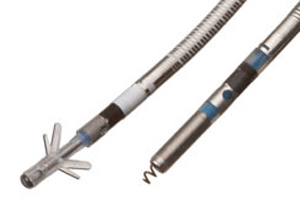
At the conclusion of a 1-day conference of cardiovascular leaders, more than half walked away feeling that the ongoing recall of St. Jude Medical’s (NYSE:STJ) Riata defibrillator leads is a more serious issue than Medtronic’s (NYSE:MDT) high-profile pullback of the Sprint Fidelis pacemaker lead.
St. Jude officials joined electro-physiologists and physicians from the Minneapolis Heart Institute Foundation and the Mayo Clinic in the Twin Cities Friday to discuss strategies for dealing with the Riata recall, ultimately concluding that more data was needed before coming up with a blanket strategy on how to manage patients with the devices already implanted.
The FDA slapped the St. Paul, Minn.-based cardiology device maker with a Class I recall for the Riata leads in December, after the company said they failed more frequently than previously reported.
St. Jude recalled the Riata leads after receiving reports of high rates of "insulation abrasion," which occurs when the leads’ wires poke through their insulation.
Friday’s meeting was closed to outside observers, including journalists, analysts and officials from other companies, but notes were provided by Cincinnati electrophysiologist Dr. Edward Schloss to editors at CardioBrief.
The meeting was organized "to develop a consensus regarding the management of patients who have these leads," but the common theme at the meeting was one of uncertainty.
The risks of insulation abrasion aren’t fully understood, according to St. Jude, but the malfunction can cause an interruption in the cables’ ability to sense rhythm problems in the heart, possibly preventing needed shock therapy or causing unwanted shocks. But not all patients with externalized conductors experience electrical malfunction.
Two patients died and another suffered a serious injury when surgeons attempted to extract the exposed leads, St. Jude said in its recall notice.
At the start of the meeting, a poll of the 63 attendees showed that 35% felt that the Riata recall posed a larger concern than Medtronic’s Fidelis recall. More than ⅖ reported feeling enough wariness toward St. Jude’s Durata lead that they’ve opted not to use it. The Durata lead isn’t on recall, but shares some design elements with Riata, CardioBrief reported.
By the end of the day, a 2nd poll found that 58% of attendees felt that the concerns about Riata overshadowed Fidelis, with 44% saying they wouldn’t choose the Durata lead in its stead.
Medtronic pulled its Sprint Fidelis leads from shelves worldwide in October 2007, but not before they were implanted in an estimated 268,000 patients. Because of fractures in the wires, defibrillators could either fail to deliver the shock needed to regulate a haywire heartbeat or send unneeded shocks. The defective leads were implicated in more than 100 deaths, although Medtronic has said that only 13 fatalities had the leads as a "possible or likely contributing factor."
The Fridley, Minn.-based med-tech titan agreed in Oct. 2010 to pay $268 million to settle multiple lawsuits stemming from the recall of its Sprint Fidelis defibrillator leads without admitting any liability.
The Riata recall affects far fewer patients by comparison. St. Jude estimates that there are about 79,000 Riata and Riata ST devices still active in patients, according to a press release.
The Riata defect, however, "is a very complex one," according to Dr. Robert Hauser, who co-directed Friday’s meeting, TheHeart.org reported.
Hauser, a well-known figure in cardiology circles, is a senior cardiologist at the Minneapolis Heart Institute at Abbott Northwestern Hospital. He said the issue with the Fidelis leads was "much more straightforward" by comparison, according to the website.
"With Riata, there are a lot of variables, and I think we’re going to need more data to understand how best to manage patients than we usually need in a recall situation," Hauser said.

